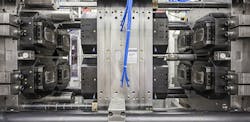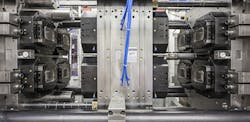New process provides injection-compression molding on stack mold
Netstal-Maschinen AG, Näfels, Switzerland, demonstrated an injection-compression molding process on a stack mold at Fakuma. Netstal developed the process with mold maker Plastisud SAS, Castelnaudary, France, and automation company Machines Pagès, Foncine le Haut, France. Netstal says it is the packaging industry's first injection-compression molding system on a stack mold.
Netstal demonstrated the process on an Elion 2800-2000 series hybrid injection press, molding eight 15-ounce PP margarine tubs at once, each weighing 10.7 grams, in a 4 + 4 stack mold, with a cycle time of about 5 seconds. The process integrates a handling system for in-mold labeling. According to Markus Dal Pian, VP of sales and marketing at Netstal, the cavities are partly filled in only 100 milliseconds, at low pressure, which prevents stresses in the material. "The high quality of the platen parallelism guarantees a synchronicity of 99.98 percent between the mold, machine and automation system," he said in a prepared statement.
In an interview at Fakuma, marketing communications director Christine Grob said that the Netstal press requires a modification to its control software and minor mechanical changes to the injection molding machine. Netstal, a brand of KraussMaffei Group USA, Florence, Ky., can sell a machine configured for the process or retrofit an existing machine. She said that as yet there are no customers using the process, which has been in development for two years.
Grob added that the process provides a 20 percent material savings, in addition to energy savings of 50 percent on the hybrid press compared to hydraulic injection molding machines. She also said the company is investigating the use of other resins in addition to the PP that has so far been used.
Grob said that Netstal started out working on the project for a single-cavity mold. "Once they realized they could make it work and saw the savings that could be realized, they went in the direction of developing the process for stack molds — 4 + 4 cavities for eight parts at a time.
"Changes to the Netstal injection molding machine and to the mold have been patented," Grob added. "All three of the companies involved with this project sell products in the U.S., so it is now available in the U.S."
"The cost to upgrade a Netstal machine for stack molds for this process is about 20,000 euros [about $22,700]," said Thomas Iten, manager of application technology at Netstal, who was also interviewed at Fakuma. He declined to say exactly what modifications have been made to the injection molding machine, but noted that the process has to be tailored for the specific product to be made.
John DeGaspari, senior correspondent
Contact:
KraussMaffei Group USA 859-283-0200, www.kraussmaffeigroup.us
Machines Pagès, 33 3 84 51 92 73, www.machines-pages.com.cn/en
Plastisud Inc., 734-223-3953, www.plastisud.com

